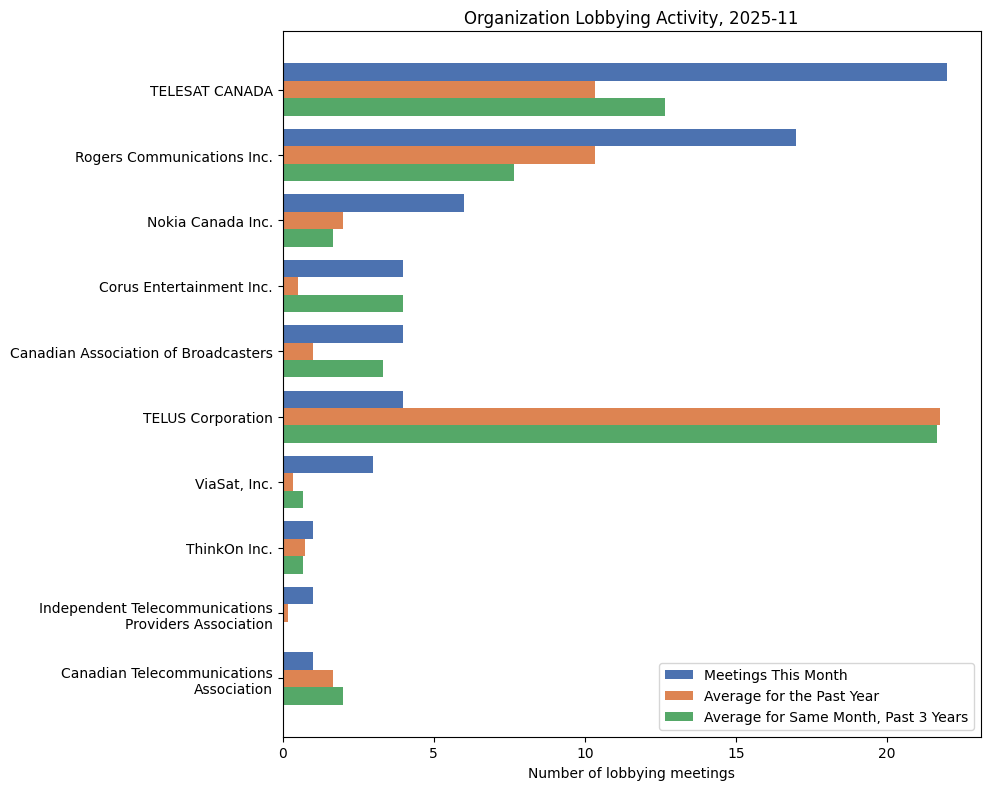QSA's Week in Telecoms (#30, 2025)
CRTC advances regulatory strategy on competition and consumer protection; Ottawa and B.C. fund rural broadband; CRTC supports local radio news; New federal spectrum consultation; US executive order accelerates data center permitting; FCC finalizes satellite sharing rules.

Good morning! This is Queen Street Analytics' weekly roundup of regulatory developments, legislative discussions, political announcements and other government-related news concerning cellphone and wireless carriers, ISPs, satellite communications, broadband access, 5G, remote communities, and CRTC spectrum licences. Every Monday, we break down the most important updates in this space in under five minutes.
Want to track other GR news in adjacent industries? Don’t miss this week’s updates in ICT & Cybersecurity and Utilities & Power.
Dates: 2025-07-27 to 2025-08-02
📋 In This Week's Newsletter
• 🇨🇦 Canadian Federal GR News
• 🇺🇸 US Federal GR News
• 🗺️ Canadian Provincial GR News
• 💬 Government Consultations
• 📚 What We're Reading This Week
Canadian Federal GR News
CRTC Chair Outlines Strategy on Competition, Broadband, and Consumer Protections
Vicky Eatrides, Chairperson of the CRTC, addressed the CIPPIC Summer Speaker Series on July 30, reaffirming the Commission’s regulatory approach to building competitive frameworks and advancing connectivity. Eatrides outlined that about 750,000 Canadian households still lack access to unlimited Internet plans at speeds of at least 50/10 Mbps, with rural, remote, and Indigenous communities remaining disproportionately underserved. The CRTC’s $750 million Broadband Fund has provided service to nearly 50,000 homes and improved cellphone coverage along 630 km of major roads. She addressed the 'Goldilocks problem' of balancing affordability for consumers and maintaining providers' incentives to invest in infrastructure. Recent regulatory moves include expanded access for smaller wireless carriers to national networks (with a 2030 infrastructure deadline), new guidance for Internet resale on major telcos’ fiber in certain areas, and rate-setting measures aimed at sustaining continued investment. Eatrides also noted steps to modernize consumer protections, referencing public proceedings to prevent bill shock, limit cancellation fees, expand self-service options, and establish clearer service plan details. An upcoming consultation on outage-related communications and refunds is planned, with a view to eventually consolidating consumer codes.
Sources: Announcements: www.canada.ca

Ottawa and British Columbia to Fund High-Speed Internet, Mobile Connectivity in Rural and Indigenous Communities
On July 28, the federal and British Columbia governments committed more than $77 million to expand high-speed Internet to over 6,900 rural and remote households in the province, including more than 1,200 Indigenous homes. Additional federal investment of $7 million will support connectivity for 727 households and bring mobile service to more than 120 km of roadway, targeting areas like Spallumcheen (Splatsin First Nation) and Hullcar. The projects, benefiting over 100 communities, are supported by CityWest and TELUS Communications. These investments are part of the Connecting Communities BC program—an $830 million joint broadband initiative—supported federally through the Universal Broadband Fund, which also offers dedicated funding for mobile projects in Indigenous communities. The government continues to pursue the goal of 98% high-speed Internet coverage by 2026 and full coverage by 2030.
Sources: Announcements: www.canada.ca
CRTC Approves New Local FM Station in Yellowknife
On July 30, the CRTC approved Cabin Radio’s application to launch a new English-language commercial FM station in Yellowknife, Northwest Territories. The decision follows a February 2025 public hearing and comes amid concerns about media diversity and local news access in the North. Cabin Radio’s proposal, noted for strong local support, includes commitments to local programming, diversity of voices, inclusion of Indigenous and French-language content, and support for emerging artists. The CRTC denied a competing application from Vista over concerns regarding market stability. This move is expected to increase programming choice in Yellowknife while adhering to commitments on community reflection and local engagement.
Sources: Announcements: www.canada.ca
CRTC Approves Temporary News Fund for Commercial Radio in Smaller Markets
On August 1, the CRTC announced conditional approval of the Canadian Association of Broadcasters' plan for a temporary Commercial Radio News Fund (CRNF), supporting news programming by commercial radio stations in smaller communities. This initiative, aligned with the modernized Broadcasting Act, aims to enhance local news where commercial radio is a primary source of information. The decision follows a consultation process and reflects previous CRTC regulatory shifts, such as requiring online streaming platforms to contribute to Canadian and Indigenous content. The fund is one of several measures—including expanded funding eligibility for local television news—undertaken by the regulator to adapt to the evolving broadcasting landscape.
Sources: Announcements: www.canada.ca
ISED Launches Consultation on Spectrum Policy for 21.2–21.8 GHz and 22.4–23.0 GHz Bands
Innovation, Science and Economic Development Canada (ISED) published a consultation on August 2 concerning policy, technical, and licensing rules for the 21.2–21.8 GHz and 22.4–23.0 GHz frequency bands for fixed services. The proposed framework seeks to expand backhaul capacity for operators. Interested parties have until September 18, 2025, to submit comments, with reply comments due by October 22, 2025. The consultation materials are available via ISED’s Spectrum Management and Telecommunications website, and submissions will inform future spectrum access and licensing decisions.
Sources: Gazette, Part I: www.gazette.gc.ca
CSE and NSERC Award $5.6 Million for Research on Cybersecurity Analytics and Unstructured Data
The Communications Security Establishment (CSE) and the Natural Sciences and Engineering Research Council of Canada (NSERC) announced a four-year, $5.6 million grant to McGill University's Professor Benjamin Fung and his team, funding research into advanced exploratory analysis of unstructured data. The "ZenithVector" project involves 14 co-applicants at 10 Canadian universities and aims to develop technologies for vectorization, embedding, and scalable cybersecurity analytics applicable to large-scale collections of text, code, and images. The initiative operates within the NSERC-CSE Research Communities Grants program, which backs research with strategic significance for federal cybersecurity policy.
Sources: Announcements: www.canada.ca
Recent CRTC Applications, Amendments, and Decisions Posted
The Canada Gazette, Part I, published on August 2, includes CRTC notices detailing recent applications, renewals, and administrative decisions between July 18 and July 24. Highlights include an application for renewal by CBC for CBF-FM-12 in Victoriaville, Quebec, with a submission deadline of August 25, and administrative decisions involving CBC (CBHA-FM in Halifax) and Bell Media (CJCB-TV-2 and CJCB-DT in Nova Scotia). Regulatory decisions issued on July 23 granted applications by Radio Nord-Joli (CFNJ-FM, Joliette, QC) and Corus Television (CHAN-DT, Vancouver, BC).
Sources: Gazette, Part I: www.gazette.gc.ca
US Federal GR News
Executive Order Aims to Accelerate Permitting for Data Center Infrastructure
Executive Order 14318, issued July 23, directs U.S. agencies to expedite federal permitting for data center projects, with a focus on AI infrastructure, energy systems, semiconductors, and network equipment. The order mandates prioritized processing for qualifying projects exceeding $500 million in capital expenditures or those with national security relevance. The Secretary of Commerce is authorized to support such projects through financial mechanisms including loans, grants, and tax incentives. Permitting reforms include the creation of new categorical exclusions under NEPA, expedited environmental reviews, and provisions making federal financial assistance below 50% of total costs presumptively not subject to extensive federal oversight. The Federal Permitting Improvement Steering Council is tasked to ensure transparency and facilitate coverage under FAST-41. The EPA will identify applicable industrial sites for reuse. The Department of Energy will cover implementation costs. The order revokes EO 14141 and reinforces compliance with prevailing laws.
Sources: U.S. Federal Announcements: www.federalregister.gov
FCC Finalizes Rules for Spectrum Sharing Among Non-Geostationary Satellite Systems
On July 31, the FCC announced the effective date for revised spectrum sharing rules under 47 CFR 25.261, following approval by the Office of Management and Budget. The rules, stemming from FCC 23-29 and FCC 24-117, apply a degraded throughput methodology to clarify protection obligations between non-geostationary satellite orbit fixed-satellite service (NGSO FSS) systems authorized in different processing rounds. Later-round licensees must either secure coordination agreements with earlier-round systems or submit compatibility showings to ensure they meet interference protection thresholds—specifically, a 3% time-weighted average throughput degradation and a 0.4% increase in link unavailability. These requirements underpin market entry and regulatory certainty for new satellite broadband constellations. The Commission’s stated goal is to promote efficient spectrum use while maintaining protections for previously authorized systems.
Sources: U.S. Federal Announcements: www.federalregister.gov
FCC Requests Comment on Information Collection for Shared Use of Radio Stations
On July 31, the FCC sought public input on its recordkeeping and reporting requirements under Section 90.179, relating to the shared use of private land mobile radio facilities by Part 90 licensees. The Notice, published in the Federal Register, addresses an extension for OMB approval (Control No. 3060-0262) for recordkeeping detailing shared users and their eligibility, which is used to investigate and resolve interference complaints. The filing period for comments runs through September 2, 2025. The collection is projected to involve 34,000 respondents annually and an aggregate burden of 34,000 hours, with no associated cost.
Sources: U.S. Federal Announcements: www.federalregister.gov
FCC Seeks Public Input on Wireless Antenna Collocation Collection
On July 29, the FCC issued a call for comments concerning its information collection under the First Amendment to the Nationwide Programmatic Agreement for the Collocation of Wireless Antennas. The public and federal agencies have until September 29, 2025, to provide feedback on the necessity, utility, and administrative burden of paperwork associated with deploying small wireless facilities under Section 106 of the National Historic Preservation Act. The 2016 amendment streamlines review for small wireless deployments, such as DAS and small cells, reducing compliance costs and deployment time. The FCC estimates an annual burden of 1,913 hours and $54,880 for 65 respondents.
Sources: U.S. Federal Announcements: www.federalregister.gov
Canadian Provincial GR News
B.C. Government Announces Provincial Share in $77 Million Rural Broadband Investment
British Columbia, together with the federal government, will contribute funding to broadband and mobile connectivity projects reaching more than 7,700 households across over 100 communities, building on the Connecting Communities BC agreement.
Sources: Announcements: www.canada.ca
Government Consultations
What We're Reading This Week
- Telus signs $1.26-billion phone tower network deal with Quebec’s Caisse: Telus and Caisse de dépôt agree on a major investment in cellular tower infrastructure.
- Ottawa, B.C. provide $77M to bring high-speed internet to nearly 7,000 households: Joint federal–provincial funding will increase broadband access across rural British Columbia.
- Federal government hanging up work cellphones for softphone technology: Ottawa transitions federal employees from traditional work phones to software-based calling systems.
- BlackBerry, Global Affairs Canada, and TMU's Rogers Cybersecure Catalyst Expand World-Class Cybersecurity Training in Malaysia: Canadian stakeholders partner to deliver cybersecurity training programs in Malaysia.
- Green Power Meets Cloud Scale: How Google (GOOGL) Shapes India’s Digital Infrastructure: Examination of Google’s infrastructure investments in India’s digital economy.

